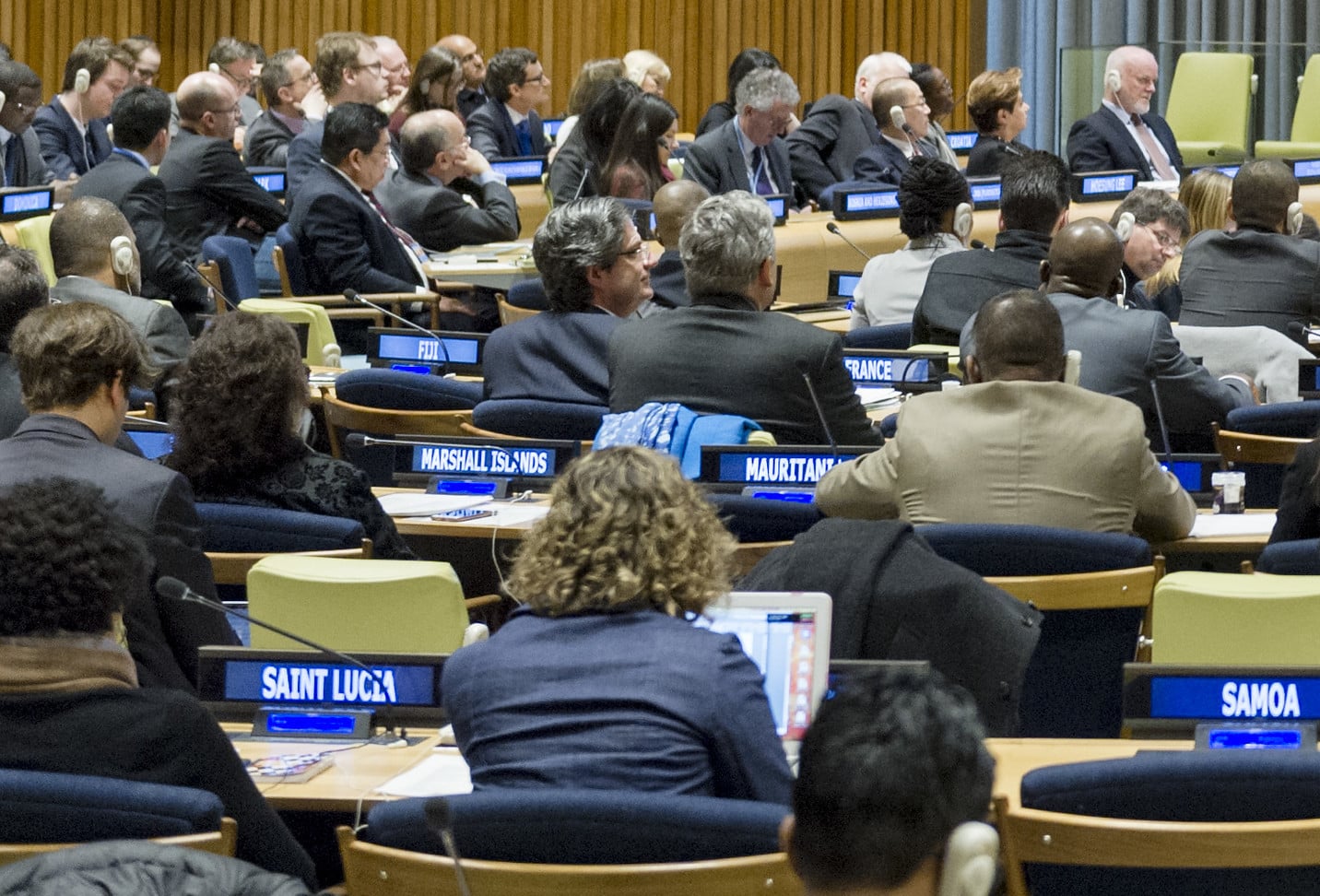As the sixth session of the United Nations Environment Assembly (UNEA-6) kicks off in Nairobi, Kenya, the Hands Off Mother Earth! (HOME) Alliance and allies have published a new briefing for delegates on what is set to be a hotly-debated topic at the Assembly: Geoengineering the climate through Solar Radiation Modification (SRM).
You can download the briefing in English, Spanish or French, or read the full version below.
The science is clear: we can still prevent irreversible harm to the climate, ecosystems, and human rights, and the only way to do so is reducing GHGs and a rapid, funded and equitable phase-out of all fossil fuels.
Solar Radiation Modification (SRM) describes an array of geoengineering techniques designed to partially block sunlight to mask the heating effect of greenhouse gasses. It does nothing to tackle the root causes of climate change, is inherently unpredictable and risks further destabilizing an already destabilized climate system with more and new extremes. It is neither insurance to ‘buy time’ nor any form of supplement to mitigation. Solar geoengineering is a recipe for disaster that delays climate action and real solutions, and puts our communities and ecosystems at unacceptable risk.
Widely discussed SRM techniques such as stratospheric aerosol injection (SAI) and marine cloud brightening (MCB) carry the further risk of ‘termination shock’ – the sudden spiraling of global temperatures if such injections were, for whatever reason, ever stopped. For SAI this means injections of chemicals into the stratosphere would need to be continued for several decades if not centuries, in effect requiring policy continuity spanning numerous generations – something that is virtually impossible to assure. In addition to severe environmental, social and political risks – which include serious threats to biodiversity and food security – SRM itself poses a clear ‘moral hazard’, risking delays to meaningful climate action that must occur in the near term.
The UN Human Rights Council’s Advisory Committee has warned that geoengineering technologies “could seriously interfere with the enjoyment of human rights for millions and perhaps billions of people”. It has also pointed out the disproportionate impact on Indigenous Peoples, peasants, fisherfolk and others living in rural areas. These same groups have been vocal in rejecting geoengineering as a dangerous distraction that would violate their rights.
By their very nature, SRM technologies cannot be tested effectively for their impact on the global climate other than through large-scale scale deployment. Small experiments cannot demonstrate whether and how the technique really affects complex climate systems. Because of the time frame and complexity they demand there is no precedent in human history to give comfort that deployment of these technologies could ever be effectively governed. The risk of unilateral deployment and weaponization is real: private actors are financing research and a company has already carried out solar geoengineering experiments for profit.
For all these reasons, SRM, along with other forms of geoengineering, has been under a de facto moratorium through the Convention on Biological Diversity since 2010, and marine geoengineering techniques are the subject of a drive for increased regulation under the London Convention / London Protocol (LC/LP), where the first geoengineering ban – on ocean fertilization – arose. Hundreds of leading scientists from multi-disciplinary backgrounds and civil society movements are in agreement on the need for states to go further and commit to Non-Use of Solar Radiation Modification.
Given the extensive, often peer-reviewed work already undertaken by experts from diverse scientific backgrounds that have informed UN decisions to date, and the nature of those findings and their scientific conclusions, we question the outcomes that would arise from establishing an expert group as per the proposal in the resolution put forward to UNEA6 by Switzerland, Monaco, Guinea, and co-sponsored by Georgia and Israel. Discussion of SRM in the manner proposed by the resolution could inadvertently undermine decisions of the CBD and LC/LP, and risks legitimizing SRM technology, while giving cover to large emitters to slow-walk the phase-out of fossil fuels.
The broad range of diverse risks that solar geoengineering entails cannot be narrowed only to environmental dimensions, which is the remit of UNEP. We also note with concern that the UNEP-sponsored ‘One Atmosphere’ report has not been peer-reviewed, does not follow IPCC standards and has not in fact been endorsed by UNEP. It controversially recommends increasing research and open-air experiments, which would only help further the development of solar geoengineering.
States at UNEA6 should focus on firmly recalling and strengthening existing decisions under the CBD and LP/LC, upholding the precautionary principle, and rights of Free Prior Informed Consent, access to information, public participation, and access to justice and remedy. In doing so, States are expected to comply with long-standing norms of international environmental law such as the obligations not to cause transboundary environmental harm and to ensure the harmless use of their territory.
Furthermore, States should acknowledge the risks posed by these most dystopian technologies by stepping up and committing to the Non-Use of Solar Geoengineering. The decision of the African Ministerial Conference on the Environment calling for a global SRM Non-Use governance mechanism shows important leadership as does the European Parliament’s explicit call to “initiate a non-use agreement at international level, in accordance with the precautionary principle and in the absence of evidence of its safety and a full global consensus on its acceptability.” The further debate of disruptive planetary technofixes is truly a dangerous distraction from the real and urgent task of tackling the root causes of the climate crisis.
Recommendations for action at UNEA 6
- Do not endorse the creation of an expert group;
- Encourage States to endorse the call for the establishment of a Solar Geoengineering Non-Use Agreement;
- Reaffirm a strong precautionary principle approach in relation to solar geoengineering;
- Ensure meaningful consultation, and that Free Prior and Informed Consent is obtained in relation to the undertaking of any projects that affect Indigenous Peoples’ rights to land, territory and resources;
- Ensure access to information, public participation in decision-making and access to justice and other remedies to the conduct of activities, including experiments, research and decision-making on solar geoengineering, as per the provisions of the Aarhus Convention and Escazu Agreement.
- Reaffirm CBD and LC/LP decisions and emphasize the need to prevent open-air solar geoengineering experiments;
- Call on CBD to ask States to implement Decision CBD X/33.8 (w) and to ask Parties to report on measures taken in accordance with this decision;
- Call on Contracting Parties to the London Convention to enable the 2013 amendment to the London Protocol as per Resolution LP.4(8) to enter into force, and uphold its provisions prior to its entering into force;
Links to resources for further information
- Solar Geoengineering Non-Use Agreement (SGNUA)
- SGNUA Solar Geoengineering Briefing Note
- CIEL Geoengineering and Human Rights briefing
- CAN-International position on Solar Radiation Modification
- African Ministerial Conference on the Environment/19/6 Decision 19/5 Climate Change
- European Parliament Resolution 2023/2636 (RSP)
- Report of the Human Rights Council Advisory Committee on the Impact of new technologies intended for climate protection on the enjoyment of human rights
- Why SRM experiments are a bad idea
- Experimentation on solar geoengineering will not be allowed in Mexico
- Media briefing: Debunking Solar Geoengineering
- Media briefing: 100 countries affirm intention to regulate marine geoengineering
- Stop solar geoengineering – resistance to solar geoengineering outdoor experimentation
- CAN-I Debunking Dangerous Distractions: Solar Radiation Modification
This briefing is endorsed by:





